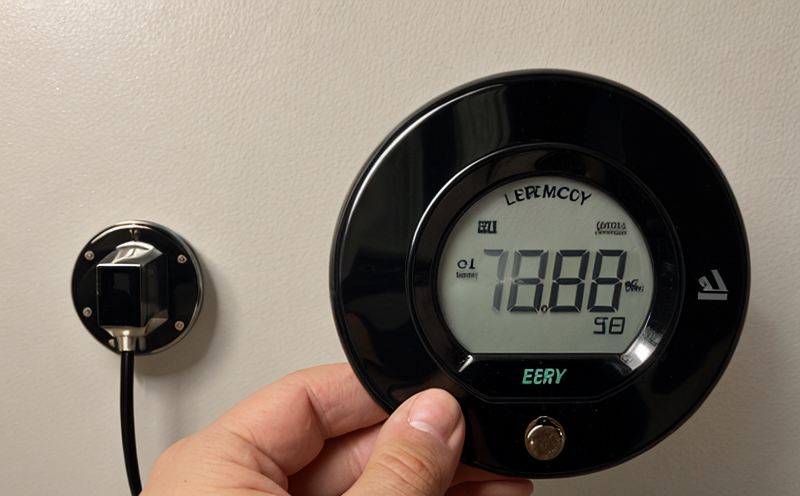ANSI AHAM HRF 1 Energy Efficiency Testing for Refrigerators
The ANSI/AHAM HRF 1 standard provides a comprehensive framework for testing the energy efficiency of home refrigerators. Compliance with this standard ensures that products meet stringent performance and durability requirements, thereby offering consumers appliances that are not only efficient but also reliable. This service is particularly crucial for manufacturers seeking to validate their product offerings against industry benchmarks.
Home refrigeration systems are a significant contributor to household energy consumption. Efficient models can lead to substantial savings in electricity costs over the lifetime of the appliance. By adhering to ANSI AHAM HRF 1, manufacturers ensure that their products not only meet but exceed these benchmarks, contributing positively to both consumer satisfaction and environmental sustainability.
The testing process involves a series of rigorous checks designed to assess various aspects of energy efficiency. These include idle power consumption, cooling capacity, and the ability of the appliance to maintain optimal temperatures under specified conditions. The standard also mandates testing in different ambient temperature environments to account for real-world usage scenarios.
For manufacturers aiming to achieve compliance with ANSI AHAM HRF 1, it is essential to understand the detailed requirements outlined by the standard. These include specific test procedures and criteria for acceptable performance levels. Rigorous adherence to these guidelines ensures that the final product not only meets but exceeds industry expectations.
The testing process typically involves multiple stages, each designed to evaluate a particular aspect of energy efficiency. This includes initial power-on checks followed by extended periods during which the appliance is monitored under various load conditions. The data collected during this phase is analyzed to determine whether the refrigerator meets or exceeds specified performance levels.
In addition to these core tests, Eurolab also offers additional services tailored specifically towards enhancing energy efficiency testing. For instance, our lab can assist in optimizing design parameters based on preliminary test results, ensuring that any necessary adjustments are made before full-scale production begins. This proactive approach helps manufacturers achieve optimal performance while minimizing resource wastage.
Compliance with ANSI AHAM HRF 1 is not just about meeting regulatory requirements but also about demonstrating a commitment to quality and sustainability. By partnering with Eurolab for your energy efficiency testing needs, you can be assured that your products will meet or exceed all relevant standards, providing peace of mind both for yourself as well as for end users.
Our team of experts is dedicated to helping you navigate the complexities of ANSI AHAM HRF 1 compliance. From initial consultation through final report generation, we provide comprehensive support throughout every stage of the process. Whether you're looking to improve existing models or introduce new innovations into your lineup, Eurolab has the expertise and resources needed to help you succeed.
Scope and Methodology
| Test Parameter | Description |
|---|---|
| Idle Power Consumption | The amount of electricity used by the refrigerator when it is not in operation. |
| Cooling Capacity | The rate at which a refrigerator can lower its internal temperature to maintain desired settings. |
| Temperature Stability | The consistency of temperature maintained within the appliance during specified periods. |
| Ambient Temperature Variations | Testing conducted under varying ambient conditions to simulate real-world usage scenarios. |
Each test parameter plays a crucial role in determining overall energy efficiency. Idle power consumption, for example, measures how much electricity the refrigerator uses while not performing any specific function other than maintaining internal temperature. Cooling capacity assesses an appliance's ability to achieve and maintain desired temperatures quickly and efficiently.
Temperature stability ensures that once set points are reached, they remain consistent over time without unnecessary fluctuations. Ambient temperature variations help account for different climates where the product might be used. By incorporating these factors into our testing protocols, Eurolab ensures accurate evaluation of energy efficiency across all conditions.
Eurolab Advantages
- Comprehensive Testing Capabilities: Our state-of-the-art facilities offer a wide range of services to support your product development lifecycle, from concept design through final certification.
- Expertise in Industry Standards: With years of experience working with global brands, we have the knowledge and resources needed to help you navigate complex regulatory landscapes worldwide.
- Dedicated Client Support: From initial consultation to post-test analysis, our team is committed to ensuring your success at every step.
- Prompt Turnaround Times: We understand the importance of timely delivery and strive to provide fast, reliable results without compromising on quality.
- Cost-Effective Solutions: By offering competitive pricing packages alongside our extensive suite of services, we aim to make compliance as affordable as possible for all clients.
Partnering with Eurolab means gaining access to world-class facilities and experienced professionals who are dedicated to helping you achieve your goals efficiently and effectively. Whether you're looking to enhance current offerings or develop new products, our services can help streamline the process from start to finish.
Environmental and Sustainability Contributions
- Reduced Carbon Footprint: Efficient refrigerators contribute significantly less CO2 emissions compared to less efficient alternatives, helping mitigate climate change impacts.
- Sustainable Resource Use: By minimizing energy requirements, these appliances reduce reliance on non-renewable resources such as fossil fuels.
The benefits extend beyond just environmental impact; they also translate into cost savings for consumers. As more households adopt ENERGY STAR certified products like those tested under ANSI AHAM HRF 1, there's an increased demand for efficient technologies which can drive innovation and further improvements across industries.
Furthermore, by adhering to stringent standards such as these, companies demonstrate their commitment to sustainability practices that benefit society at large. This aligns with broader trends towards greener manufacturing processes and product lifecycle management strategies aimed at reducing environmental footprints throughout every stage of production.





